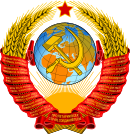
Back تاريخ الاتحاد السوفييتي Arabic Historia de la Xunión Soviética AST SSRİ tarixi Azerbaijani История на Съветския съюз Bulgarian Història de la Unió Soviètica Catalan مێژووی یەکێتیی سۆڤیەت CKB Dějiny Sovětského svazu Czech Sovjetunionens historie Danish Geschichte der Sowjetunion German Historia de la Unión Soviética Spanish
| Part of a series on the |
| History of the Soviet Union |
|---|
 |
|
|
| History of Russia |
|---|
 |
|
|
| Part of a series on the |
| Culture of the Soviet Union |
|---|
 |
| People |
| Languages |
| Traditions |
| Cuisine |
| Festivals |
| Literature |
| Music |
| Sport |
The history of the Soviet Union (USSR) (1922–91) began with the ideals of the Bolshevik Revolution and ended in dissolution amidst economic collapse and political disintegration. Established in 1922 following the Russian Civil War, the Soviet Union quickly became a one-party state under the Communist Party. Its early years under Lenin were marked by the implementation of socialist policies and the New Economic Policy (NEP), which allowed for market-oriented reforms.
The rise of Joseph Stalin in the late 1920s ushered in an era of intense centralization and totalitarianism. Stalin's rule was characterized by the forced collectivization of agriculture, rapid industrialization, and the Great Purge, which eliminated perceived enemies of the state. The Soviet Union played a crucial role in the Allied victory in World War II, but at a tremendous human cost, with millions of Soviet citizens perishing in the conflict.
The Soviet Union emerged as one of the world's two superpowers, leading the Eastern Bloc in opposition to the Western Bloc during the Cold War. This period saw the USSR engage in an arms race, the Space Race, and proxy wars around the globe. The post-Stalin leadership, particularly under Nikita Khrushchev, initiated a de-Stalinization process, leading to a period of liberalization and relative openness known as the Khrushchev Thaw. However, the subsequent era under Leonid Brezhnev, referred to as the Era of Stagnation, was marked by economic decline, political corruption, and a rigid gerontocracy. Despite efforts to maintain the Soviet Union's superpower status, the economy struggled due to its centralized nature, technological backwardness, and inefficiencies. The vast military expenditures and burdens of maintaining the Eastern Bloc, further strained the Soviet economy.
In the 1980s, Mikhail Gorbachev's policies of Glasnost (openness) and Perestroika (restructuring) aimed to revitalize the Soviet system but instead accelerated its unraveling. Nationalist movements gained momentum across the Soviet republics, and the control of the Communist Party weakened. The failed coup attempt in August 1991 against Gorbachev by hardline communists hastened the collapse of the Soviet Union, which formally dissolved on December 26, 1991, ending nearly seven decades of Soviet rule. The legacy of the Soviet Union is complex, leaving behind significant industrial achievements, military prowess, cultural influence, and an impact on global politics, but also a record of repression, economic inefficiencies, and the suppression of political and personal freedoms.